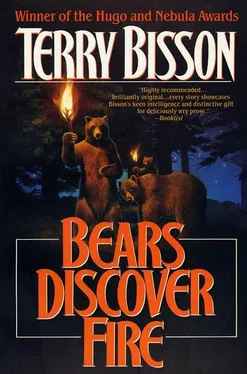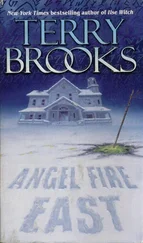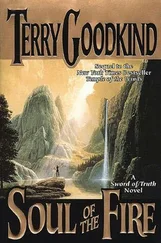I was tempted to wake up the kid. Behind me and below, in the big mirrors, a sea of clouds stretched two hundred miles. Ninety percent of the atmosphere was below us. You never actually see Kentucky and Tennessee from up here, only their permanent cloud roof. The clouds are pushed in from the west by the jet stream and they pile up like foam along the west front of Flat Mountain for two thousand miles, from Maine to Alabama. It’s as beautiful from the top as it is gloomy from the bottom. The clouds ate the whole city of Lexington, not to mention Pittsburgh, and Huntsville, and a hundred little country towns that nobody remembers anymore, north and south.
I let the kid sleep and popped in Loretta Lynn. For some reason I like girl singers better up on top.
A few more hours of driving and the clouds are hidden under the bulk of the mountain. There’s nothing in any direction but stone and sky, bone-white and blue-black. The stars look like chips of ice, too cold to twinkle. It’s a hundred below outside and you’re at 122,500. This is where if you’re looking for landlobsters you start finding them.
The kid woke and sat up, rubbing his eyes. He didn’t say anything for forty miles and I appreciated that, because when you’re looking at the high top of Flat Mountain there is truly nothing to say. It’s my favorite part of the route. It gets flatter and emptier the higher you go. I always imagine it’s like Creation must have looked before they got to the plants and animals, and how it’ll look when it’s all over.
Toward the very middle of the high top I always play Patsy Cline, and if you don’t know why, don’t ask.
There’s no longer a sign of Knoxville. No longer a sign of Asheville. During the eight years of the Uplift, the constant high-frequency vibration from the dome expanding turned the soil to jelly, and most of it ran into the cracks opening in the ground or ran off the mountain in sheets like slow-motion water taking the trees and what was left of the towns with it. All the way in Nashville, you could hear the mountain groan. The high top looks scoured, with every once in a while a long shallow ditch filled with logs and leftover trash. These ditches are all that’s left of mighty forests and cities and it can’t help but put your pride into perspective to look upon them.
The road across the top of Flat Mountain is straight and the slope is gentle, less than 3 percent, up for forty miles, then down for another forty. The road jogs between old 23 and Interstate 40. This is where Flat Toppers can gear up and roll out, to gain back the time they spent sniffing steam at the Blue Balls.
The log ditches are where you look for landlobsters.
“My dad sold one once,” the kid said. He was looking hard for one, maybe thinking I would stop to kill it. He didn’t know how hard they were to kill.
Your dad must have swapped or stole it off a Flat Topper, I thought to myself, since they never wander down as far as Hazard, though I didn’t say this.
“He got a hundred dollars. Said they were descended from other planets.”
Actually, the real truth is better. When the Appalachians uplifted, it either proved or disproved evolution, depending on who you’re talking to. One thing it proved was that it doesn’t take millions of years for a new species to evolve. The first landlobsters showed up less than six years after the Uplift started, although they weren’t nearly as big as the ones today.
“Do you sell them?” the kid asked.
“Used to.”
“Wonder what they eat,” the kid said.
“Wood and glass.” At least they say they eat glass. I’ve seen them eat logs. They won’t eat anything alive but if they get hold of a man they’ll drag him off until he dies and then gnaw him like a dog with a bone.
It’s not often you see one on the road. The kid was watching the log ditches off to the side so he didn’t see it. I was listening to Dolly sing “Blue Ridge Mountain Boy,” a song they don’t play much anymore, and I almost didn’t swerve in time to hit it.
“What was that?” the kid says as I throw on the brakes. He started zipping up his oversuit and got two zippers jammed. It was the first time I’d seen him get excited and I had to laugh. He thought we were having a wreck. I had my oversuit zipped up and my mask on—it protects your face and eardrums—before he looked in the rear-view mirror and saw what we had hit.
“You don’t want to be getting out,” I said. I sprayed my throat with C-Level and stuffed the can in my pocket.
“Hand me that Boy Scout hatchet from under the seat,” I said.
He was watching it in the mirror, gray-white, the color of gravestones, and at least thirteen feet across the claws. I doubted he’d seen one before, alive. Not many people have. “You going to kill it?” he asked. “It’s still flopping.”
Once you crack the shell, they’re dead from decompression, but dying can take all day. I hadn’t gone looking for it, but since it came to me—I flipped down my mask and climbed across the kid, since the airlock is on his side. I crossed under the truck and approached it carefully. It was still venting steam out of the cracks in the shell where my truck had passed over it. I had missed all but one claw. There’s about sixty pounds of meat under the back but High Top Meat won’t buy lob out of the shell. With the hatchet, jumping in, I cut off the one big and four smaller claws I hadn’t marked, tossing them under the truck. Since the lobster was dragging itself away from me, toward the shoulder, I turned my back on it. After all that activity, I needed another shot of C-Level, which means lifting your mask for a second. I gathered up the claws and I was about to strap them onto the spare tire rack with a bungee cord when, next thing I knew, the thing had pulled my leg out from under me and was dragging me toward the side of the road.
It was the tire-marked claw. I should have cut it off and tossed it away. I shouldn’t ever have turned my back on it. It had me by the boot and was starting that slow sideways cut even while it pulled, and I knew I was in trouble. He still had six legs, each as big as a fencepost, and he was taking me home with him.
I reached for but missed the tire rack. I reached for but missed the hatchet. I reached for the big, soft rear trailer tire, even though there’s no place to grab it—then I saw two shots crack the lobster’s shell. You don’t hear shots in a near vacuum. I looked back and saw the kid ducking under the truck from the other side, shooting. Even with the big gloves on he hit it twice more, but you can shoot those things all day long. They’re like snapping turtles. I pointed at the Boy Scout hatchet, waving my arms, but the kid was falling. I hadn’t left any breath spray for him. He was sealed in his suit and turning blue. But just as he fell he pushed the hatchet close enough for me to reach it.
Thank God for the Boy Scouts. I chopped my foot free, and wearing the claw like a clamp on my leg, dragged the kid under the truck, up the ladder and into the cab. Even inside in the air, he could barely breathe. The fall had knocked his mask loose, and his tongue and throat had swelled up from decompression. Luckily they make a spray for that, too, and I had some in my first-aid kit under the seat. I’ve had it used on me and it’s bad. It puckers you up like eating a green persimmon but it works. It’s called GAZP.
I pried the claw off my boot and stuck it up under the seat. When I was sure the kid was breathing, I went back out and got the 9 mm where he had dropped it. The lobster was gone and the claws I had cut off were gone, too, so the whole thing was a waste. I wasn’t surprised. They say he eats them.
“Well, kid,” I said when we were in gear again. “You saved old CD’s butt back there.”
Читать дальше












